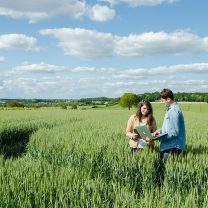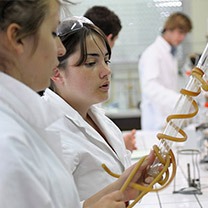
Overview
- Our goal is to develop a transdisciplinary approach to design products and production itineraries considering the different dimensions of quality (composition, sensory characteristics of grape and wine and environmental impacts of the production).
- Such approach takes into account the different stakeholders and consumers, involved in innovation to sustain the design process.
- In our projects, we wish to address a more systemic vision of the sustainability of grape and wine production and to work in a participative approach with stakeholders.
- Our expertise is in characterizing the composition of grapes and wine, with usual methods and non-destructive methods, like hyperspectral imaging and Raman spectroscopy, with sensory methods (like profiles, mixed profiles …), consumer test, and the Life Cycle Analyses for the determination of environmental impacts. The main topics cover wine typicity, climate change, increasing wine quality and reduction of environmental impacts of the production.
- Our goal is to develop a transdisciplinary approach to design new food products (from fresh and transform fruit, vegetables and legumes) considering the different dimensions of quality (composition, nutrition, sensory characteristics of products and environmental impacts of the production).
- Such approach takes into account the different stakeholders and consumers, involved in innovation to sustain the design process, which is realized thanks to participative approaches.
- In our projects, we wish to address a more systemic vision of the product innovation process.
- Our expertise is in characterizing the composition of raw materials, with usual and non-destructive methods, like hyperspectral imaging and Raman spectroscopy, with sensory methods (like profiles, mixed profiles …), consumer test, and the Life Cycle Analyses for the determination of environmental impacts. The main topics cover food issues with the protein transition in particular. We wish to contribute to the evolution of citizen’s consumption habits of for a better health.
- Food sciences
- Fruits and vegetables
- Life Cycle Analysis
- Viticulture Oenology
- Physical analyses
- Biochemistry and non-destructive analyses
- Sensory analysis
- Consumer behavior
- Statistics and data analysis
- Environmental quality
- Eco-design, co-conception
- Typicality
USC GRAPPE is a research unit, working on multi-criteria assessments of the physicochemical, nutritional, sensory and environmental qualities of fruits, vegetable products (fresh and processed), whose grape and wine.
The research activities of the unit are structured around 2 areas:
- How to objectively assess quality and typicality of so-called specific products ?
- How to provide professionals with methods and tools, adapted to their needs for assessing the quality of their products?
- How to evaluate the environmental performance and quality of these products?
- How to build models to predict and assess the quality?
- What are the interactions between a quality sign (AOP or Label) and the environmental dimension perceived by consumers?
Which factors influence product quality and typicality and what are the interactions / synergies between these factors?
- How to integrate the variability of raw materials and production methods in the design of differentiated quality products ?
- How to design coupled innovations (innovations in production and processing) and consider the strategies of different actors concerned by that innovation to establish the process design?
The team comprises 28 people, including 24 permanent staff. Researchers belong to the academic departments “Food, Technology and Bioresource Sciences” and “Viticulture and oenology“. The unit is structured into 2 main services:
Dedicated to scientific and technical production, including our three main domains of expertise, headed by a scientific coordinator:
- T1.1: Methods and tools to evaluate the composition of products
- T1.2: Reliability of methods dedicated to sensory characterisation
- T1.3: Assessment of environmental impacts (LCA method)
All these tools and methods help to assess the quality of products and to optimize their quality and/or their production in a co-building approach with professionals and consumers.
Building partnerships with companies to carry out technical studies, advice and training. These projects are based on expertise developed through research. They constitute a transfer of research to the socio-economic world. It is also an entry point for companies, allowing the subsequent development of research projects in partnership.
Unit equipment is located in two different sites:
Sensory & Consumer Platform: 20 up to date standardised sensory booths – a dedicated focus group room equipped with camera and microphone. The sensory platform also has a fully equiped professional kitchen to prepare dishes.
Processing and formulation spaces with autoclave, professional Ovens, homogenizer, professional bread kneaders, Doser machine, Mixer-cutters, vacuum packaging machine and tray-sealer machine.
Physico-chemical Platform: Biochemical analyses with UPLC-MS, HPLC, automatic titrator and Discrete Analyzer; Texture analysis with viscometer, Universal Testing Machines; Optical analysis: NIR, MIR and UV spectrophotometer, spectro-colorimeter, hyperspectral imaging set up, Raman spectroscopy and Backscattering laser imaging system.
Consultancy Services
From idea to marketing, we support you throughout your innovation process. Depending on your specific needs, we’ll build a tailor-made project together. Our experts are involved in the following activities:
From aperitif to dessert, we’ll help bring your ideas to life!
- Creativity sessions
- Provider search
- Formulation
- Aging tests
- Pilot tests in partner halls
- Support for industrialisation
Through instrumental measurements, we objectively define the quality, the typicality and the relationships between the different properties of your products.
Global measurements and biochemical quantification: Texture, colour, acidity, water content, polyphenols and carotenoids, vitamins, antioxidants, fibers, sugars, proteins, …
Nondestructive optical analyses: Hyperspectral imaging, Raman spectroscopy, Laser imaging.
Sensory profile
Our trained panel are experts in the characterisation of vegetable proteins, fruits and fresh and transformed vegetables.
What could be more important than what consumers think about your new product or concept? Thanks to our base of 1,500 local consumers, we question specific targets according to your needs. In particular, we have developed expertise within the senior market. We organise multi-site tests in France and internationally through our network of partners to understand consumer preferences.
Focus group: to validate your new concepts
Preference mapping: to relate consumer preferences to the sensory or physicochemical characteristics of a product.
Need methodological support in sensory analysis or data processing? Let us advise you and train your teams.
Study programmes
There is a continuous link between research and teaching.
Lecturer-researchers at USC GRAPPE work in the departments of Food and Bioresource Science and Techniques and Viticulture and Oenology.
Master-level training associated with the GRAPPE:
Viticultural and Agri-Food Engineer programmes engineering school, mentor the importance of research in professional life.
Since 2000, the GRAPPE unit has experienced significant development, driven in particular by the creation of 2 International Master’s Degrees in the food processing sector, both recognized by Erasmus Mundus: International VINTAGE and Food Identity Master’s (DNM – Erasmus Mundus label).
Researchers of the GRAPPE Research Unit also participate in the Professional Bachelor dedicated to local products, which welcomes every each students from Netherlands and Kazakhstan thanks to bilateral agreements.
Researchers provide lectures, practical works and manage research projects with students.
As part of its research activities, USC GRAPPE hosts and supervises research internships. For the last 3 years, 19 students have worked with us on an instership of 2 to 6 months.
Examples of internships over the last 3 years:
- Characterization of agroecological transition strategies in wine production systems under official quality signs in Pays (AOP)
- How to promote agroecological practices to consumers in the wine industry?
- Acceptability of fermented vegetables
- Evaluation of the functional and nutritional properties of legumes
- Ability of Raman spectroscopy to discriminate between red wines of different appellations
- Impact of the use of barrels on the composition of still white wines
- Evaluation of the in vitro digestibility of plant proteins: implementation of the methodology.
- Evaluation of the impact of enriched breakfast meals on snack and evening food intake in elderly subjects living in residential facilities for dependent elderly people.
- Accompanying agroecological transitions for eco-design: for a better consideration of nitrogen emissions due to fertilization and green manures in viticultural Life Cycle Analyses.
- Determination of acceptability thresholds for bitterness, acidity, sugar and astringency of cider apple juice
- Evolution of the phenological stages with climate change in viticulture
Partners
The USC GRAPPE is:
Integrated in the INRAE structure as USC (contrated unit).
A Member of the Federative Research Structure SFR QUASAV (Plant Quality and Health).
A Host laboratory for the VAAME doctoral school (Plant, Animal, Food, Sea, Environment).
An Associate partner of UMT STRATEGE
Main partners
University of Angers (LISA, GRANEM, SONAS), INRAE (IRHS, BIA), Oniris (Sensometry and Chemometrics Unit, LARGECIA, Flaveur team of GEPEA), ESEO, UMR SAS INRAE Rennes, Agrocampus Ouest.
INRAE, UMR SayFood, UMR SQPOV, UR SAD-ASTER, UMR SPO, UE Pech Rouge, Dijon Centre for Taste and Food Sciences, CTCPA, ISA, Supagro Montpellier, UMT NOVACIDRE, IFPC, Reims University.
DTU Danish Technological University (Denmark)
ART (Agroscope Reckenholz Tänikon) (Switzerland)
DeFENS (Departement of Food, Environmental and Nutritional Sciences), University of Milan (Italy)
Wageningen University and Research Center (Netherlands)
NOFIMA (Norway)
The National Institute of Horticultural Research (Poland)
The Research Unit has numerous partnerships (non-exhaustive list).
Technical institutes and centres
Agricultural technical institutes and centres are specialised in valorisation and transfer :
- French Wine and Vine Institute
- Centre technique interprofessionnel des fruits et légumes (CTIFL – Inter-professional Fruit and Vegetable Technical Centre)
- Centre technique des produits cidricoles (CTPC – Technical Centre for Cider Products)
The Unit is also a member of competitive clusters :
The Research Unit has partnerships with manufacturers, institutes, technical centers and wineries.
VEGEPOLYS Valley
USC GRAPPE is a member of Végépolys Valley group. They regularly join up at trade fairs and professional events (Wine Fairs, Fruit and Vegetable Events, Conferences, etc.). As part of Végépolys’s Living Lab Végéconso, ESA supports plant-based companies specialising in the co-construction of their innovations with consumers.
VALORIAL
ESA is a member of the agrifood cluster. Several researchers from USC GRAPPE participate in the various committees.
-
CHAIR
Since january 2021, USC GRAPPE participates in the AAPRO chair coordinated by the GRANEN research unit from the University of Angers.
The Chair project focuses on the integration of alternative proteins in food with the aim of increasing protein sources and reducing environmental impacts. Its aim is to strengthen scientific expertise, to enrich the training of future agri-food industry executives and to support companies in the Loire region that wish to move towards this transition by proposing a systemic approach, from producers to distributors, and based on a user-centered approach to respond to consumer needs.


Do you have a question ?
Corporate Relations Service
Direction of Corporate, Alumni and Philantropic Relations
+33 2 41 39 64 67 dream@groupe-esa.com
